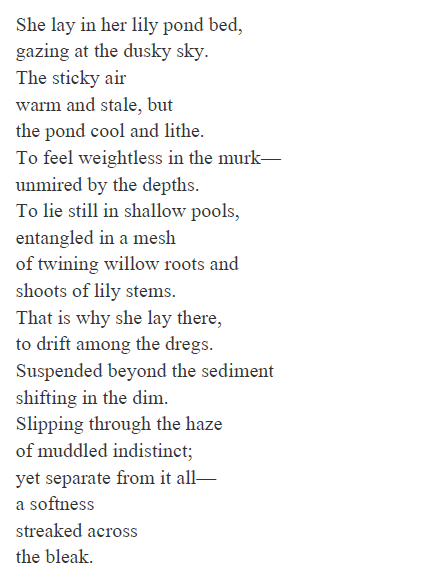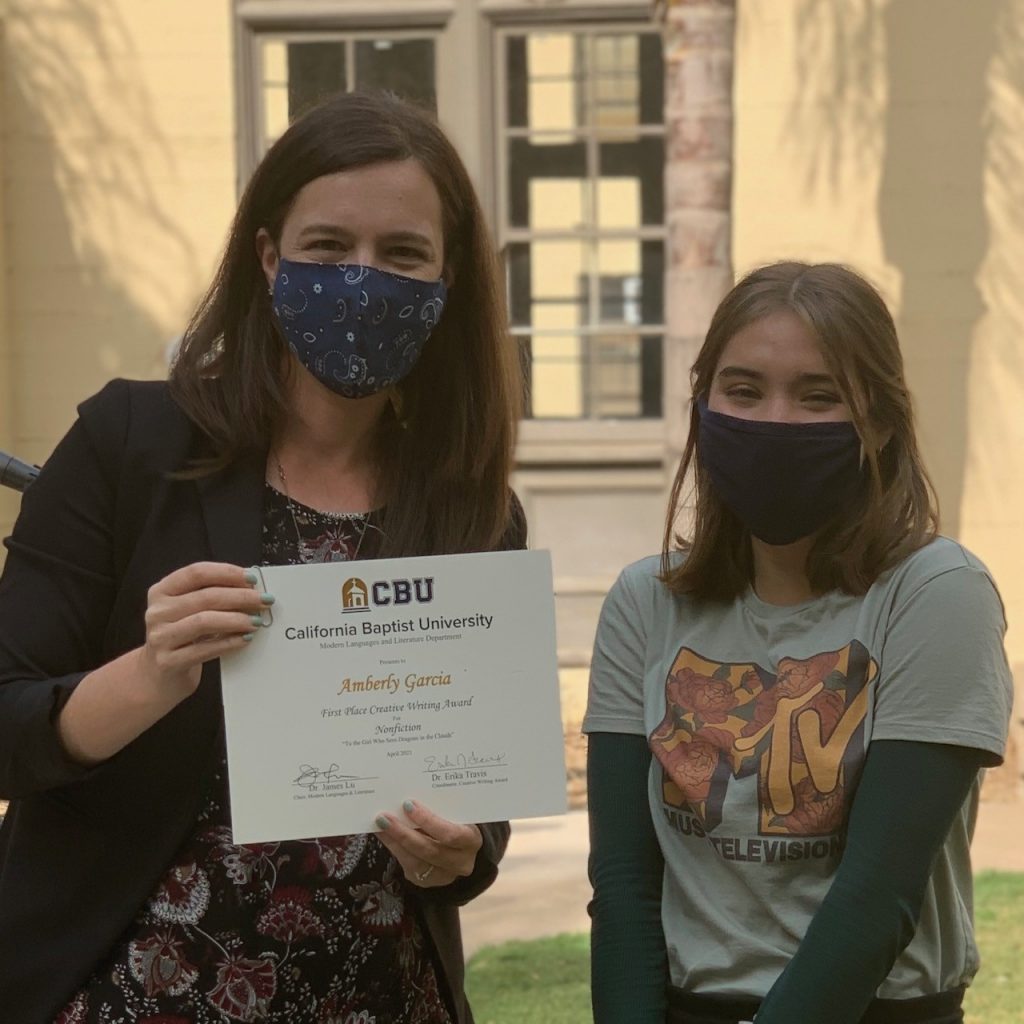Amberly Rose Garcia
2021 CBU Creative Writing Contest Honorable Mention—Poetry




“To the girl who sees dragons in the clouds” is a scrap of poetry I stumbled across on Pinterest. Meagan Spooner wrote the poem for the dedication of her novel Hunted. This phrase is the first and third lines pieced together. I pinned it to my inspiration board.
This Pinterest board exists to collect little particles of genius. It gathers gleanings from Google searches that make me think and explore differently. I paint, pace, and ponder these scraps of inspiration. They molder and then fester into a germ of an idea. Hopefully, they sweep me off into a creative spurring of motivation. This rarely happens. But this scrap of poetry stuck with me. I painted it on a cotton candy skyscape. You know, the puffy Pepto-Bismol clouds that exist in kids’ cartoons. It’s about the only thing I can paint without peering at it after and believing I’ve marred the pristine canvas.
I paint not because I am skilled or necessarily enjoy the product afterward, but because it releases some tension bundled beneath my sternum. Sometimes I need to press my thumb to the tension, to acknowledge it is truly there. The pressure from my thumb meets with the pressure in my chest, greeting each other in a kiss. Somehow this relieves the tension in the way touch always does, like falling back into my pillow, rubbing my face into my cat’s fluffy neck, and pushing myself into the crevice between my mother’s arms. So, among writing in cursive, doodling, tapping my foot, running my hands through my hair, dancing, and steeping in a hot bath until my palms are wrinkled, I paint to alleviate anxiety. All these things disembody me, if only for a moment, from the stifling pressures of existence.
The painting, with the poem scrawled over it, meshes with the sharpie outline of a dragon. Thick, inky wings and a furling tongue of flame spread from the dragon, clashing against the puffy pink sky. The dragon is regal, yet menacing. Its eyes are shaped like lightning bolts.
It’s been hanging on the wall next to my bed for about eight months now—a record-breaking time. I rarely keep anything up for that long. I’ve pondered those words, wondering what they meant to me. Why had I chosen to paint it? Many other snippets of inspiration were left to molder until they disintegrated into my unconsciousness. Why was this string of words any different?
The poem is addressed to the girl who sees dragons in the clouds. It’s supposed to render a whimsical effect as if the author is addressing her book to all those dreamy individuals discovering magic in the world. At first glance, I believed this to be its only meaning. A lovely little thought, letting you know that you’re not alone—the poem celebrating your lofty ideals and your charming quirks. But “to the girl who sees dragons in the clouds” has become more than just a whimsical phrase to me. Its scope spans beyond nostalgia ridden days or times spent cloud watching on grassy hillsides.
The poem is addressed to the girl who sees dragons in the clouds. It’s supposed to render a whimsical effect as if the author is addressing her book to all those dreamy individuals discovering magic in the world. At first glance, I believed this to be its only meaning. A lovely little thought, letting you know that you’re not alone—the poem celebrating your lofty ideals and your charming quirks.
Dragons are fearsome beasts. Storytellers of yore labeled them as malicious and greedy creatures. Dragons snatch up whatever they like, hoarding it away or eating it. For eight months, I have left the painting hanging up, pondering the phrase. I now analyze it differently and have discovered the meaning anew.
The other night, I cried. Bawled, actually. Hot tears seeped out and down my flushed face. My breath caught in my chest as I made odd little gasping noises, trying to gulp down oxygen. This kept on for an hour. I rarely cry. It’s so rare for me to cry that sometimes I crave it, especially when the pressure in my chest won’t relinquish its clench. I cried that night because I met a dragon.
You can detect dragons based on the steely glint in their eyes. Sometimes they’re dinosaurs with craggy skin and a shaky voice. They wobble towards you with a cane they would like to bang on your head. Sometimes they’re tiny terrors that scamper about, kicking up insults in their wake. Sometimes they have power over you. Sometimes you give the power to them. This dragon had power over me, but I gave her more power than she had.
I have a grocery store job that I dislike. There are many reasons why I dislike it, but I won’t smear them across this page in a long list. It doesn’t help. But it does help to list the things I like about it, such as getting a paycheck, allowing it as an excuse to step away from homework, and growing. I’ve done a lot of growing in the months I’ve worked there. I never thought that I would cry over my job, yet this is precisely what I did.
I was the only closer that night besides the cashier and manager. This new manager had different expectations than other managers I had closed with. Her expectations were higher and stricter. I became her henchman, scurrying about trying to get the checklist done that usually had three people completing its tasks.
Finally, the night was up. After crushing my toes with a massive steel sign, smashing my fingers, hauling in carts, and scrubbing down all but one check stand, I bid the dragon good night. She interrupted me, mid-sentence, complaining that the last check stand had not been wiped, and adding that I couldn’t leave until it was done, ignoring the fact we were closed, and I was technically allowed to go based on my schedule. With that sharp reprimand still steaming from her nostrils, she whipped away into her office, letting the door smack shut behind her. I hurried and wiped down the last check stand, scampered to the clock, and punched out. I had done what she asked; I was free from the dragon’s clutches.
However, as I headed towards the door, I saw the cashier wiping down the check stand I had just cleaned; the cashier had been in the back while I’d cleaned it. He usually helped me wipe down the check stands, so it wasn’t unusual. Just then, the manager came stomping out and told me that it’s not the cashier’s job to clean check stands. She continued with her reprimanding, telling me I needed her permission to leave and that I should do what she’d asked.
I was near tears. I had done everything she had asked all night, and she hadn’t even bothered to learn my name. Instead, she had referred to me by the term “you” throughout the night. It didn’t matter if the cashier’s job description didn’t include wiping down cash registers. He did it because he was helpful and kind; everything this steaming dragon was not.
Before the manager could finish her rampaging torrent of rebuke, I interjected, “I just cleaned that check stand.”
My voice didn’t shake, and I didn’t sound impertinent. I just stated the fact as clearly as reciting that the sky was blue. I masked the tempest roiling within well. I could tell she felt a little stupid at that moment.
All she said was, “oh.”
I briskly left the store, pounding down the pavement towards the car. I felt that pressure in my chest building until it tore out of my mouth in a sob. I cried all the way home as my dad drove, listening to my story.
“I just want to quit!” I repeated for the third time. “I hate this job, and I just want it to end.”
I didn’t know why she had made me so upset. There were plenty of times when I had dealt with difficult people at this job, including psychologically disturbed customers and disgruntled co-workers. But the way she had treated me throughout the night, in a callous and controlling manner, not acknowledging my hard work or even bothering to learn my name, made me feel empty.
I wanted to feel validated, not downtrodden by the endless pile of work. I wanted to feel free from the worry whirling around me all hours of the day. Most managers said thank you, offered a smile, or bantered to keep us from nodding off that late in the night. Little things like that eased the pressure.
She hadn’t bothered with pleasantries, and that’s what bothered me. I tried so hard to maintain a positive attitude because it made me feel courageous. I put on a brave face, even when the toil attempted to tear me apart. I appeared gracious and good-natured, always ready to help. But she went about her work with a commandeering attitude, intensity emanating from those sharp, dark eyes.
As I collapsed onto my bed that night, I passed by the painting. I didn’t see it in the dim shadows or reflect upon it in the brooding hours after midnight. Yet its truth still hung there. It was scrawled in deep sharpie letters, waiting for me to see, to read between those lines.
In the following weeks, I finally discovered the hidden message. The substance beyond the fanciful. The meaning whose glimmer I’d detected the day I decided to paint it.
To the girl who sees dragons in the sky, take courage. You have a beautiful mind and a whimsical way of peering at the world. You notice that the cracks in the pavement form lightning bolts. That dust is just like gray powdered sugar. How sometimes, between three and five pm, the sunlight streams in through the windows and illuminates aisle one so that it looks like a liquid gateway to heaven is melting into the tiles you sweep. The world is so much richer when you seek out these things, so don’t let them slip away. But the world is also more fearsome because of this gift.
You can spot the monsters writhing in the shadows and detect the pitch of their whispers. Sometimes they morph into a frenzy and feed on your frantic spirit. They feast on fury, or jealousy, or despair. There are times you personify the lumpy shapes in the closet or under your bed. But you don’t have to fear. You have the power to see past it all. Don’t forget about the cotton candy clouds. Violent storms with all their noise and gloominess are just pillowy comforters swirling around in a washing machine. It’s just the way you look at it. It’s the meaning beneath.
To the girl
who reads by flashlight
who sees dragons in the clouds
who feels most alive in worlds that never were
who dreams
This is for you.
─ Meagan Spooner, Hunted, 2017

The winner of The Dazed Starling 2021 creative writing contest for nonfiction is Amberly Garcia’s “To the Girl Who Sees Dragons in the Clouds.” Contest winners receive a cash prize as well as having their work published in the journal.
Keep an eye out for “To the Girl Who Sees Dragons in the Clouds” in an upcoming blog post.
